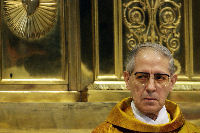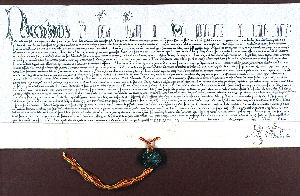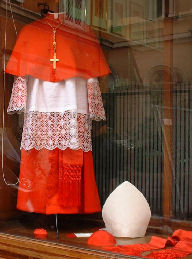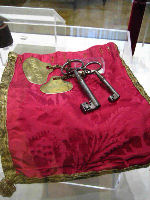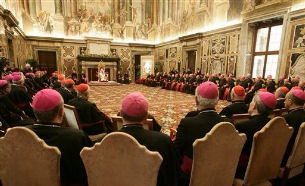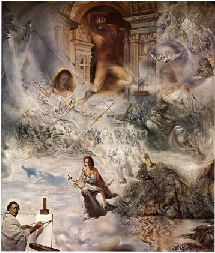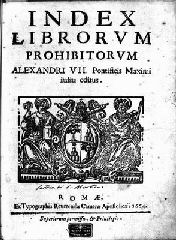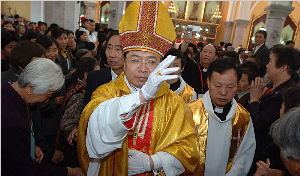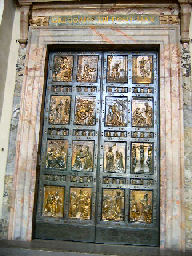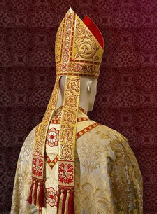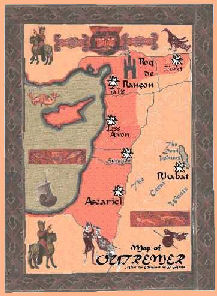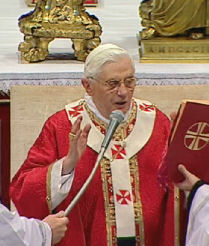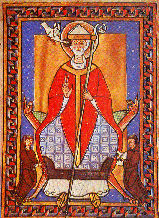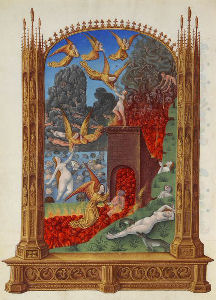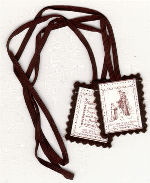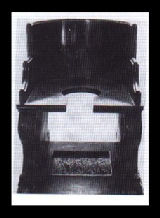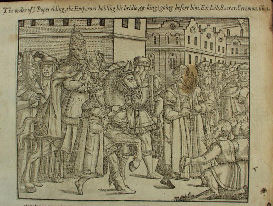Appendix 3: A Papal Lexicon
Adoration: The process in the conclave whereby a candidate with enough votes to be elected pope is declared to have won all of the votes.
Anathema: A major excommunication publicly promulgated, usually by the pope. Also used as an adjective meaning condemned, usually for heresy.
Annate: The first year’s income from a benefice. It often devolved to the pope.
Antipope: A person with a serious but unrecognized claim to the papacy. Approximately forty-two men are generally classified as antipopes.
Archpriest: Generally the senior priest in a diocese.
Benefice: An income-producing office or the income itself. Some pontificates were financed largely through the selling of benefices.
Black Pope: The pejorative popular term for the Superior-General of the Society of Jesus.Breviary: A book of prayers recited throughout the day by monks and other clergy.
Brief: An official but limited communication from the pope. It is sealed with the Fisherman’s Ring.
Bull: An official communication from the pope issued to some or all members of the Church. The name does not describe the contents of any specific treatise; it comes from the Latin word bulla, the seal affixed to the document with lead. A bull can only be overturned by another bull.Bishop: All bishops are priests. Most are responsible for a geographical set of parishes. Bishops have the authority to ordain priests and deacons.
Camerlingo: The cardinal in charge of Church affairs during the conclave.
Canonize: To name someone a saint. Only the pope can canonize. Many early saints came from lists called martyrologies; they were never canonized.
Capitulation: An agreement in which a prospective candidate for the papacy promises to certain provisions for the person or people (usually the cardinals in conclave) appointing or electing. In 1352 Pope Innocent VI declared capitulations, including the one to which he had sworn, illegal.
Cardinal: The word means pertaining to a hinge. Starting in about the third century the original cardinal-priests were the ordained clergy in Rome who served as liaisons between the pope and Roman parishes. There were also seven cardinal-deacons who were originally administrators of the seven regions of Rome. Cardinal-deacons generally were not priests. The concept of a cardinal-bishop was established by the eighth century. There were always seven cardinal-bishops corresponding to the seven dioceses in the duchy of Rome until Porto was combined with Santa Rufina. By the ninth century the cardinals had become a sort of a cabinet for the pope. As a group they are called the “College of Cardinals.” Between 1059 and 1179 this group became the official electors of the pope. Shortly thereafter they began to function like a board of directors. Popes seldom acted without consulting them. In some cases the cardinals even asserted superiority as a body over the popes. In 1567 the assignment of cardinals was freed from the references to specific dioceses and roles. The vast majority of cardinals today are “cardinal priests,” even thought almost all are also bishops. The title of “Cardinal” is often placed between an individual’s first and last names. Thus, Pope Benedict XVI was previously known as Joseph Cardinal Ratzinger.Collagium: A fee paid by priests to bishops for the right to keep a concubine. Originally this was a punishement issued after the fact. Some priests however prepaid the fine and used the collagium like a dispensation.
Conclave: The word is Italian for “with key.” In order to pressure the cardinals to come to a timely agreement on the name of the new pope, they were locked into the meeting chamber. The word also refers to the meeting of the cardinals to elect a new pope.Consistory: A meeting of the cardinals. Today the meetings are almost always held for the purpose of elevating new cardinals.
Constitution: Another word for a papal bull or encyclical.
Contumacy: Insubordination. The Council of Basel threatened to charge Pope Eugene IV with this crime.
Creature: A cardinal is said to be a “creature” of the pope who appointed him.
Curia: The Roman curia is the executive branch of the government of the Church. Each diocese will normally have its own curia, but the term most often refers to the Roman curia.Deacon: A person who has been ordained by a bishop to act as his assistant. Deacons are not allowed to administer the sacraments, although they can preach at mass and assist in the administration of the Eucharist.
Decretal: A letter from the pope addressing a doctrinal matter.
Diocese: A bishop’s territory.
Divine tradition: The Roman Church considers unwritten sources approved by the pope as equal in value to scripture. Some Catholic doctrines are largely based on divine tradition.
Ecumenical council: Pronouncements of ecumenical councils are infallible. For a council to be infallible it must meet three criteria: (1) It must be open to bishops of the whole world; (2) It must be presided over by the pope or his legates; (3) Its decrees must be confirmed by the pope. The Church considers some councils partially ecumenical. Some councils that seem to fail some of the criteria are nevertheless deemed ecumenical.
Encyclical: An official letter written from the pope ex cathedra to some or all bishops. It has the same effect as a papal bull.
Excommunication: Banning of an individual from the communion of Christians. The excommunicant may not participate in the sacraments. Excommunication can be invoked by whoever has jurisdiction in the matter, usually the bishop, a council of bishops, or the pope. Excommunication can be revoked. Catholics are prohibited from dealing with excommunicants.
Exequatur: In a religious context, the claimed right of a sovereign to approve papal decrees, including the appointments of prelates within his jurisdiction.
Holiness: One of the pope’s titles.
Holy Father: One of the pope’s titles.
Index: The list of forbidden books first published in 1557 and abolished in 1966.
Indulgence: See chapter 9.
Inquisition: See chapter 11.
Interdict: The excommunication of a group en masse. It differs from excommunication in that “it does not cut one off from the communion of the faithful or from Christian society, though the acts of religion forbidden in both cases are almost identical.”[1]
Interstices: The prescribed period of waiting required between the various level of the clerical hierarchy.
Investiture: The right claimed by feudal lords to appoint bishops and other prelates within their territories. The atheistic government of China still claims the right to appoint Catholic bishops. It exercised this authority as late as April, 2006.
Jubilee: A Holy Year declared from time to time (currently every twenty-five years) by the pope. The first was in 1300. Certain indulgences are available only in Jubilee years. One door to St. Peter’s Basilica in Rome is sealed shut except in those years. Lappets: Two strips of cloth that hang down from the pope’s tiara.Martyr: Someone who dies for his/her faith. In the early centuries the term was used more loosely to describe a saintly person.
Missal: A book of prayers and scriptural readings used at mass. The texts vary at least on a weekly basis.
Monte: The Italian word for mountain. This word is sometimes used for a particular method of selling Church offices. The original type, monte della fede, reverted to the pope on the death of the holder. Pope Clement VII introduced the monte non vacabile, which could be passed on to heirs. Both paid high rates of return for the purchasers and were underwritten by specific taxes.
Mortal: A sin serious enough to merit damnation to hell.
Obedience: During the Western Schism the followers of the three popes were known as the Roman Obedience, the Avignon Obedience, and the Pisan Obedience.
Outremer: The European colonies in the Middle East during the crusades. Pallium: A circular band of cloth worn about the neck. It has a pendant in front and in back. The pope wears the pallium and may authorize others to do so, but no authority is granted thereby.Papabile (pah PAH bee leh) (plural = papabili): Candidate for the papacy.
Patriarch: The bishops of Rome, Antioch, and Alexandria were called patriarchs and considered to outrank the other bishops. Constantinople and Jerusalem were added in the fourth and fifth centuries. Others were named later. The title no long grants special privilege in the Roman Church.
Peter’s Pence: In the 700’s the English began sending payments called Peter’s Pence directly to the pope. The original payment was allegedly one pence for each house in the kingdom. The Vatican now takes American Express, Visa, Diner’s Club, and MasterCard and will accept donations of any size.
Pontiff: Derived from the Latin term for bridge-builder. In pagan Rome the pontiffs were on the highest council of priests. The chief priest was the Pontifex Maximus. Bishops assumed this title, but now it is generally reserved for the pope.
Pope: The Latin term “papa” is a familiar term for father. For centuries many bishops were called popes. The popes in Rome claimed the term “universal pope” as applicable only to themselves. This phrase was later shortened to pope. In 1073 Pope Gregory VII declared that the term pope was to be reserved for the Bishop of Rome.Porphyry Chair: See Sella stercoraria.
Priest: A man ordained by a bishop and authorized to administer the sacraments.
Prorogation: Suspension or delay of the action of a group.
Purgatory: A “place” for venial sins to be burned off to allow entry into heaven. Its existence was inferred from a few lines in the New Testament and a story in Maccabees.Sacrament: The Catholic Church names seven: Baptism, Confirmation, Holy Eucharist, Penance, the Sacrament of the Sick (formerly known as Extreme Unction), Holy Orders, and Matrimony as delineated by the Council of Trent in 1546. Only priests can administer sacraments except under extremely abnormal circumstances.
Scapular: A blessed device of cloth worn around the neck. The Carmelites claim that wearing the brown scapular grants an indulgence. Pope John XXII allegedly had a vision about its power.Schism: A split. The two most famous are the Great Schism (Greek v. Latin) and the Western Schism (Rome v. Avignon v. Pisa).
Scrutiny: Results of an election. Each vote in the conclave is called a scrutiny.
See: Synonymous with “diocese.” Almost every bishop has a see. The see of Rome is called the “Holy See” or the “Apostolic See.”
Sella stercoraria: A chair that looks like a toilet seat. In the traditional investiture the pope sat on this seat. The cardinals helped raise the new pope from the lowly seat. Also called the Porphyry Chair, it has not been used for centuries.Simony: The buying and selling of clerical offices. The term refers to Simon Magus, who reportedly tried to buy powers from Sts. Peter and Paul in Acts 8:18-24.
Strator: The “Donation of Constantine” described a ceremony in which Constantine acted as groom (strator) for the pope. He led the pope’s horse by the bridle. Christian leaders traditionally performed this function as an act of deference to the popes.Synod: Another term for a council, usually of bishops.
Synoptic Gospels: The gospels of Mark, Matthew, and Luke, which agree on many particulars. Scholars speculate that a lost text (called “Q”) was the source for all three.
Tetragamy: Four marriages by one person. It was forbidden by the eastern Church.
Venial: Describes a sin that is not serious enough to merit damnation to hell.
Veneration: Saints can be venerated, but never worshipped. Others can also be venerated in certain circumstances.
Vicar: A representative. The popes claimed to be the Vicar of Peter. Since Peter was known as the Vicar of Christ, this title was also claimed by the pope. Nicholas I called himself the Vicar of God, but it did not catch on.

